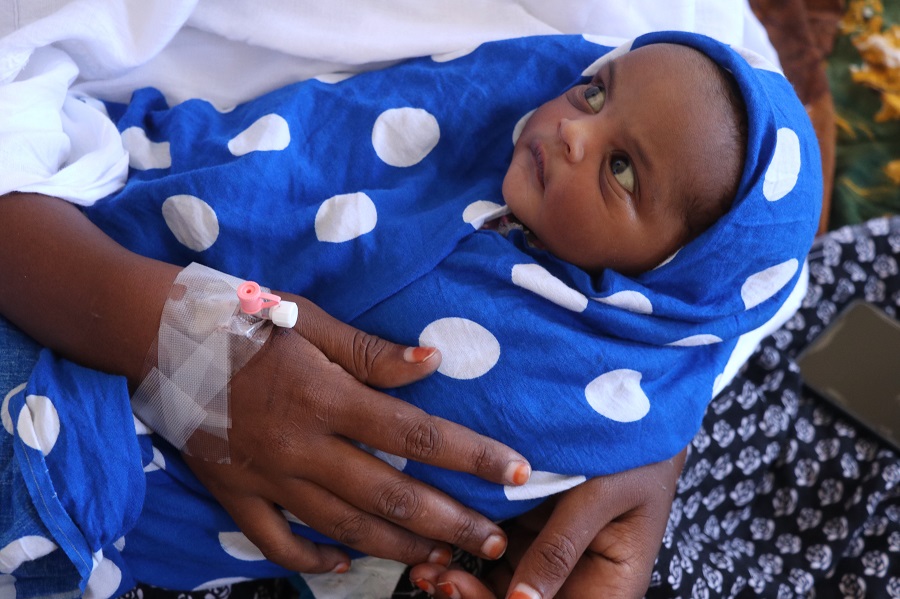 Early initiation and exclusive breastfeeding are crucial for the healthy growth and development of newborns. Credit: WHO/Somalia
Early initiation and exclusive breastfeeding are crucial for the healthy growth and development of newborns. Credit: WHO/Somalia
Mogadishu 4 August 2023 – The Federal Ministry of Health and the World Health Organization (WHO) Somalia country office join the international community and partners in commemorating World Breastfeeding Week, which is held annually from 1 to 7 August to highlight the importance of breastfeeding for both mothers and children.
This year's theme, "Let’s make breastfeeding and work, work," focuses on workplace barriers that prevent women from breastfeeding or cause them to stop breastfeeding earlier than recommended. The Federal Ministry of Health and WHO country office are urging all partners to work together to establish breastfeeding-friendly environments in all health care facilities and workplaces across the country to promote and enhance exclusive breastfeeding rates among Somali women.
Somalia has some of the highest rates of neonatal and under-5 mortality in the world, with an under-5 mortality rate of 117 per 1000 live births. In addition, more than 1.8 million children under 5 are currently at risk of severe malnutrition and related health complications due to the ongoing drought crisis. Undernutrition is a global concern associated with 45% of all child deaths annually. If all children between 0 and 23 months are optimally breastfed, over 820 000 children's lives could be saved each year.
To provide optimal infant protection, WHO and UNICEF recommend initiating breastfeeding within the first hour of birth and continuing exclusively for 6 months. Breast milk contains essential antibodies and nutrients that promote healthy growth and development. In Somalia, only 60% of children are breastfed within the first hour of birth, and just 34% of infants under 6 months are exclusively breastfed. This can cause dietary deficiencies, which are prevalent among children of all age groups in Somalia. Such deficiencies can result in childhood illnesses like respiratory diseases, diarrhoea, wasting and stunting. Hence, it is crucial for children to have good nutritional status to support their growth and development.
The Federal Ministry of Health, at both the federal and state levels, recognizes the significance of breastfeeding and has prioritized it in the national health sector strategic plans. "Breastfeeding provides numerous health benefits for both newborns and mothers. Therefore, it is important to create supportive environments that are conducive to breastfeeding at all levels of society,” said Farhan Mohamed, Head of the Nutrition Unit at the Federal Ministry of Health. “Breastfeeding also has the potential to reduce health costs and result in economic gains for families and the nation as a whole,” he added.
To promote and improve breastfeeding practices, the WHO country office supports the Federal Ministry of Health in implementing the national nutrition strategy 2020-2025, with the primary goal of increasing the number of babies aged 0–6 months old who are exclusively breastfed to above 50% by 2025. Additionally, as part of drought response efforts, WHO provides vitamin A supplementation and/or micronutrient supplements to children under 5 and pregnant women. WHO also supports the Ministry in implementing the maternal, infant and young child nutrition plan and provides technical support and capacity-building for health care workers.
This important work is made possible thanks to the generous funding from the Delegation of the European Union (EU), European Commission Humanitarian Aid & Civil Protection (ECHO), and Central Emergency Response Fund (CERF). WHO takes the technical lead in maternal, newborn and child health and Dr Al-Umra Umar noted, “By promoting breastfeeding, Somalia can strengthen its health care system, reduce health care associated expenses, and promote a productive and safer workplace and healthier workforce for the future.”
For additional information, please contact:
Kyle DeFreitas
External Relations Officer
Fouzia Bano
Communications Officer
Related links
WHO launches training to transform care of mothers and newborns in Somalia


